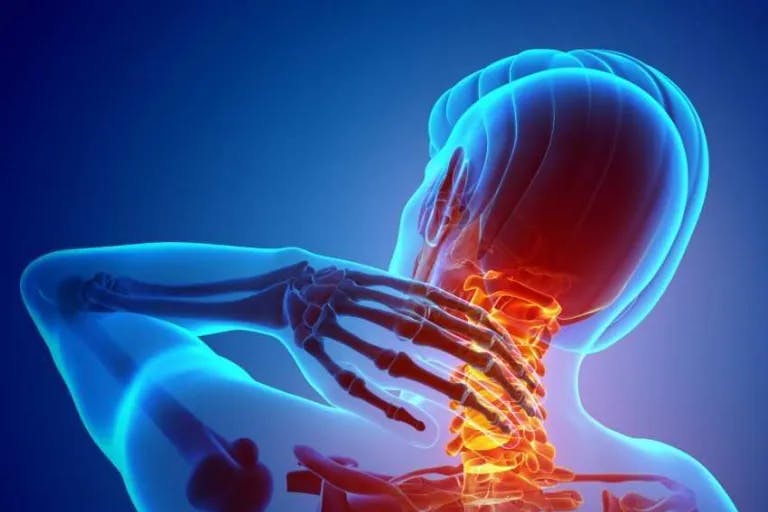.97077bf4.webp&w=640&q=75)
Pinched Nerve

A pinched nerve is a common condition that can cause a range of uncomfortable symptoms. It occurs when the nerve is squeezed or compressed, typically due to surrounding tissue or bone. This can lead to symptoms such as pain, tingling, numbness, and weakness in the affected area.Pinched nerves can happen in any part of the body, but they are often seen in the neck and lower back. These areas are prone to nerve compression due to the heavy use and stress they experience on a daily basis.Fortunately, pinched nerves can often be treated effectively with a combination of physical therapy, medication, and lifestyle changes. Our team of expert neurologists at our Beverly Hills clinic are highly skilled in diagnosing and treating pinched nerves, and can help you find relief from your symptoms.Don't let a pinched nerve hold you back any longer. Book an appointment with us today and take the first step towards feeling better. Our convenient at-home and telehealth services make it easy to access top-quality care from the comfort of your own home.
Frequently Asked Questions
What is a pinched nerve?
A pinched nerve is a condition that occurs when a nerve is compressed or squeezed by surrounding tissue, such as bones, muscles, or cartilage. This pressure on the nerve can cause pain, numbness, tingling, or weakness in the affected area.
What are the symptoms of a pinched nerve?
he symptoms of a pinched nerve can vary depending on the location of the nerve and the severity of the compression. Common symptoms include:
Pain, tingling, or numbness in the affected area
Weakness in the muscles controlled by the affected nerve
A burning or shooting pain that radiates along the path of the nerve
Difficulty moving or controlling the affected body part
Loss of sensation or feeling in the affected area
How do I know if I have a pinched nerve?
If you are experiencing any of the symptoms mentioned above, it is important to see a healthcare provider to determine the cause. Your healthcare provider will perform a physical examination and may order imaging tests, such as an MRI or nerve conduction tests, to diagnose a pinched nerve.
What are the most common treatments for a pinched nerve?
The treatment for a pinched nerve will depend on the severity of the condition and the underlying cause. Some common treatments include:
Resting the affected area to allow the swelling and inflammation to decrease
Physical therapy to help strengthen the muscles and improve flexibility
Over-the-counter pain medications, such as acetaminophen or ibuprofen, to reduce pain and swelling
Wearing a splint or brace to support the affected area and limit movement
Injecting corticosteroids into the affected area to reduce inflammation
Surgery, in severe cases, to remove the tissue or bone compressing the nerve
What are the potential complications of a pinched nerve?
If left untreated, a pinched nerve can lead to complications, such as permanent nerve damage or loss of function in the affected area. In some cases, the condition can progress to chronic pain and disability.
How long does it take for a pinched nerve to heal?
The length of time it takes for a pinched nerve to heal will depend on the severity of the condition and the effectiveness of the treatment. In most cases, a pinched nerve will improve within a few days or weeks with physical therapy. In more severe cases, it may take longer to heal and may require surgery.
Can a pinched nerve cause long-term damage?
If left untreated, a pinched nerve can cause permanent damage to the affected nerve and surrounding tissue. This can lead to chronic pain and loss of function in the affected area.
Can pinched nerves be prevented?
In some cases, pinched nerves can be prevented by avoiding activities that put excessive pressure on the nerves, such as carrying heavy objects or repetitive movements. Wearing proper support when engaging in activities that put pressure on the nerves, such as wearing a wrist brace for carpal tunnel syndrome, can also help prevent pinched nerves.
Are there any natural remedies for a pinched nerve?
Some natural remedies that may help relieve the symptoms of a pinched nerve include:
Applying ice or heat to the affected area to reduce swelling and inflammation
Stretching and strengthening exercises to improve flexibility and muscle strength
Massaging the affected area to improve circulation and relieve tension
Using essential oils, such as peppermint or eucalyptus, to reduce pain and inflammation
Taking herbal supplements, such as turmeric or ginger, to reduce inflammation and pain.
Can a pinched nerve be treated with acupuncture?
Yes, acupuncture is a treatment option for a pinched nerve. Acupuncture involves the insertion of thin needles into specific points on the body to stimulate the nervous system and improve circulation. This can help reduce pain and inflammation in the affected area and promote healing of the pinched nerve.